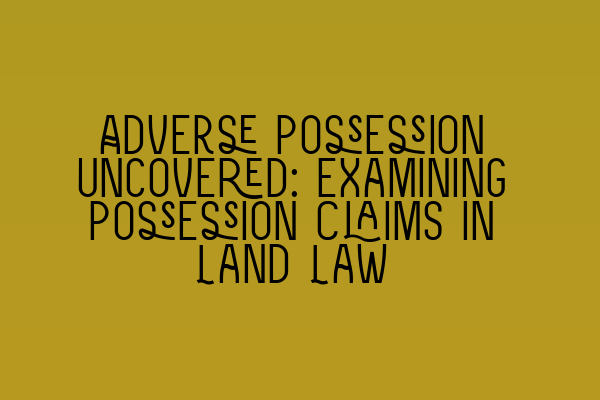Adverse Possession Uncovered: Examining Possession Claims in Land Law
Adverse possession is a fascinating and often misunderstood concept in land law. It is a legal principle that allows someone who is not the legal owner of a piece of land to become the rightful owner through continuous and exclusive possession for a specified period of time. In this blog post, we will delve into the intricacies of adverse possession, exploring its origins, requirements, and potential implications.
Origins of Adverse Possession
Adverse possession has its roots in the common law system and can be traced back to ancient legal principles. Historically, adverse possession served as a means to ensure that land was put to productive use and that possession was valued. Over time, it has evolved into a complex area of law that requires careful analysis and consideration.
Requirements for Adverse Possession
To successfully claim adverse possession, certain requirements must be met. These requirements vary depending on the jurisdiction, but some common elements include:
- Actual and exclusive possession: The adverse possessor must physically occupy the land and have exclusive control over it.
- Open and notorious possession: The possession must be obvious and visible to the true owner or the public.
- Continuity of possession: The adverse possessor must demonstrate uninterrupted possession for the required period of time.
- Hostile possession: The possession must be without the true owner’s permission and against their rights.
- Statutory period: In most jurisdictions, the adverse possession claimant must demonstrate possession for a specific period of time, typically ranging from 10 to 30 years.
Meeting these requirements is crucial to establishing a strong adverse possession claim. It is essential to consult with an experienced property law solicitor to ensure all legal requirements are fulfilled.
Implications of Adverse Possession
Adverse possession can have significant implications for both the current landowner and the adverse possessor. For the current landowner, an adverse possession claim can result in the loss of their property rights if the claim is successful. It is therefore important for landowners to be aware of the possibility of adverse possession and take appropriate measures to protect their interests.
On the other hand, adverse possession can provide an opportunity for individuals who have occupied and maintained land without legal title to gain ownership. This can be especially valuable in cases where the land has been neglected or abandoned by the true owner. Adverse possession can also serve as a means to resolve disputes over boundaries or unregistered land.
However, it is important to note that adverse possession claims are complex and the outcome is not guaranteed. The true owner of the land may contest the claim, leading to legal proceedings and potential litigation. Therefore, seeking professional legal advice is essential for both adverse possessors and landowners facing adverse possession claims.
Conclusion
Adverse possession is a captivating area of land law that poses both opportunities and risks. Understanding the requirements and implications of adverse possession is essential for anyone involved in land ownership or occupation. By seeking the guidance of a skilled property law solicitor, you can navigate the complexities of adverse possession and protect your legal interests.
If you’re preparing for the SQE 1 or SQE 2 exams, be sure to check out our related articles:
